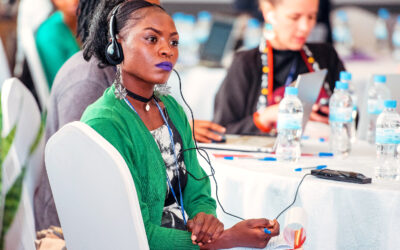There are few things more fundamental in life than marriage. It is the foundation of family. It provides legal and cultural structure for society.
There is growing recognition, however, that for many women and girls in the Democratic Republic of the Congo (DRC or Congo), marriage can be slavery. It can begin through abduction and rape. It can be arranged by fathers to repay debts. These brides enter marriage against their will. They are forced to provide labor without compensation. They cannot pursue their own life goals. And they cannot escape.
A new FTS exposé, Wives in Slavery, examines the causes and impacts of forced marriage in the Congo – through the stories of women and girls who have experienced it firsthand. The case studies provide a lens into the reality of how forced marriage occurs, how it is hidden in plain view, often without being challenged, and how it adversely impacts both the wives who are enslaved as well as society at large. Researchers outline how forced marriage meets the legal definition of slavery under international conventions and DRC law, the conditions that create vulnerability to enslavement, and the physical and psychological toll that forced marriage inflicts on Congolese women.
KEY FINDINGS
- FORMS OF FORCED MARRIAGE: In the Congo, forced marriages typically fall into one of four classifications: marriage by rape, marriage by sale, marriage by kidnapping, and child marriage.
- DEBT: Poverty or debt within a woman’s family increases her vulnerability to forced marriage. Many cases of forced marriage are negotiated settlements that absolve a family member, often a father, of debt.
- CONFLICT: The military conflict in eastern DRC has increased the vulnerability of women to forced marriage by creating a climate where there is limited rule of law. Armed combatants ignore laws with impunity, taking women and girls from their homes.
- CHILDREN: Girls are especially vulnerable to forced marriage because they have less power due to double discrimination of being both children and female in a patriarchal society. Child marriages result in high-risk pregnancies with greater rates of both maternal and neonatal illness and death.
KEY RECOMMENDATIONS
- JUSTICE SYSTEM: Legal revisions are needed to prevent discrimination against women and prohibit or significantly limit the use of a dowry or bride-price in marriage. Judicial strengthening is needed to support prosecution of forced marriage crimes. Increased cooperation and coordination among key players in the justice system is needed, including police, courts, local governments and civil society.
- SCHOOLS & CLINICS: Improved services in schools and health facilities are needed to ensure cases of forced marriage are identified and addressed effectively.
- COMMUNITY EDUCATION: Increased support is needed for grassroots movements that can effectively address local attitudes and practices through dialogue, education, and other communications.
- SCALE-UP SUPPORT: Increased and coordinated monitoring, evaluation, and knowledge management is needed to ensure continuous learning and the scale-up of practices that are raising awareness and reducing vulnerability to forced marriage.
Current and former slaves interviewed during this research project commonly stated that it will be necessary to change attitudes in the Congo in order to end forced marriage. Many community members, including wives in forced marriages, do not realize that the practice is illegal. Education about the right to consensual marriage, along with education on the harmful impacts of forced marriage, can help Congolese residents make forced marriage a thing of the past.
The full report is available from the Free the Slaves Congo webpage.



